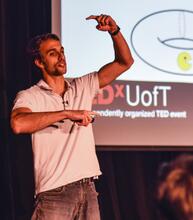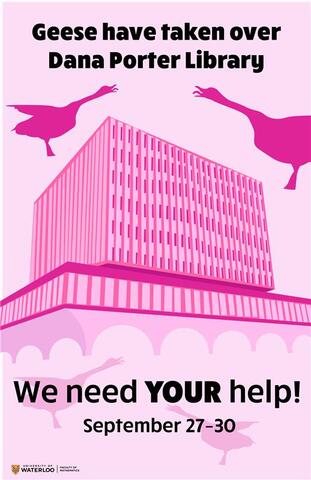 Ty Ghaswala (PhD ’17) is a Lecturer in the CEMC, an adjunct professor in Pure Math and the organizer (or Principal Enigmatologist) for the Key Clues Competition. Key Clues, which ran from September 27 to October 3, is a team-based community engagement and development activity that encourages undergraduate students, graduate students, postdoctoral fellows, alumni, staff and faculty members to work together in groups of 3-6 to solve a series of puzzles.
Ty Ghaswala (PhD ’17) is a Lecturer in the CEMC, an adjunct professor in Pure Math and the organizer (or Principal Enigmatologist) for the Key Clues Competition. Key Clues, which ran from September 27 to October 3, is a team-based community engagement and development activity that encourages undergraduate students, graduate students, postdoctoral fellows, alumni, staff and faculty members to work together in groups of 3-6 to solve a series of puzzles.
In just its second year, Key Clues had 476 participants. There were 554 total puzzles solved and 68 teams solved at least one puzzle. 30 teams submitted solutions for 10 out of 15 puzzles and 10 teams correctly completed the entire competition. The closing ceremony recognized two of these teams: “wait,” which had the highest score, and “Biggest Fans of Blake,” which were the first to submit their key at the secret location.
This year's puzzles (and hints and solutions) can be found on the website. The next Key Clues Challenge is tentatively set for January 2025.
We asked Ghaswala about Key Clues and his love of puzzles. The following is a lightly edited transcript of a Q&A interview.
|
Try a Key Clues puzzle! Ghaswala is sharing a puzzle exclusively with our E-Ties readership. Send your answers to mathalumni@uwaterloo.ca. The solution will be published in the next issue of E-Ties and we will share the names of those who submitted correct answers. |
|---|
Q&A with Ty Ghaswala
Q: How did you first get into puzzles?
A: It was my first year at Melbourne University in 2008. I was living away from home at residence. Someone in my college was advertising a puzzle hack, which I had never heard of. He made this huge mural out of chalk on the quad and I was very curious. This was part of what was called the Melbourne University Maths and Stats Society (MUMS) puzzle hunt. There were only two Australian puzzle hunts at the time and MUMS was the longest-running. So I joined the college team and turned up to the library where our team was hanging out to try to solve the puzzles. I didn't make any progress on any of the puzzles we were working on but I just loved it. After that, I made sure we competed every year.
Q: What was it that you enjoyed so much about solving puzzles?
A: When you're solving a well-written puzzle, you're stuck for a while and then you have some kind of ‘aha’ moment. It’s so satisfying to notice something that just makes everything click. It has the ability to make you laugh or make you smile on the inside. You think: “Oh, that's good. That's beautiful. That’s a very nice piece of art.” These puzzles are sort of unlike anything else because they don't have rules. It’s not like a sudoku or crossword puzzle where you know exactly what you have to do. You’re just presented with something. Maybe it's just a series of pictures or it's just a question mark on a page. Where is the information? You try every single thing you can do.
notice something that just makes everything click. It has the ability to make you laugh or make you smile on the inside. You think: “Oh, that's good. That's beautiful. That’s a very nice piece of art.” These puzzles are sort of unlike anything else because they don't have rules. It’s not like a sudoku or crossword puzzle where you know exactly what you have to do. You’re just presented with something. Maybe it's just a series of pictures or it's just a question mark on a page. Where is the information? You try every single thing you can do.
Q: How does solving puzzles bring people together?
A: There's a team element and there's a competition element, but the stakes aren't very high. So it’s not a terribly hostile environment. There’s this mutual understanding that you’re going through this ridiculously difficult thing together and that creates a bond. With other teams on campus, you see people walking around with a puzzle and you're like, “Oh, you’re competing in the hunt, too.” Ultimately, if you put on a good event, the community part takes care of itself. I just want as many people around who enjoy puzzles and then you’ve got something in common.
Q: Where do you get the inspiration for Key Clues puzzles?
A: Often you get inspiration for a puzzle just by walking around and seeing something, like some regularly designed signposts on campus. You think, “There’s enough information there that I can turn this into a puzzle.” Or sometimes there are restraints on what the answers can be because we want it to all tie together for a meta-puzzle later in the competition. Maybe you have this really interesting word for the final answer and the puzzles need to lead there.
We had an amazing development team this year. We met maybe two or three times in August to write the puzzles and test them. Usually, a draft of a puzzle comes out and people will try it. They’ll come back and say, “This is garbage. This is really good. Maybe try to do this.” Oftentimes, the puzzle completely morphs into something else. At other times, it's just about tweaking an image a little, because the original was too ambiguous. Each puzzle goes through about three or four iterations.
Q: What are the educational benefits of doing these types of puzzles and competing in puzzle hunts?
A: I think it warms up your persistence muscles. It teaches you that you can bang your head against the wall and get nowhere and then try again tomorrow. I think that's a useful skill and that’s what transfers over to mathematics and helps with research. Research is the same: you're often stuck (at least in pure mathematics, which is my field) with 99% no idea what to do. Something has to click and you just have to try everything you can until it does. And it usually clicks when you're not working on it, when you’re on a walk or something. But at the end of the day, the priority of these puzzle hunts is to enjoy yourself. It’s nice that there are these side effects, but the reason we do puzzles is not to train for something else, it’s to have as much fun as possible.






